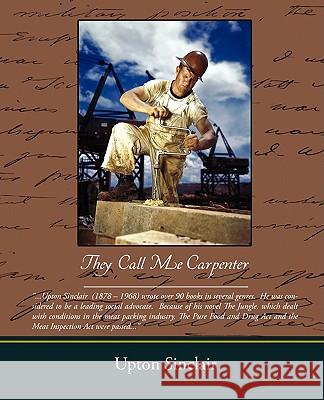They Call Me Carpenter » książka
They Call Me Carpenter
ISBN-13: 9781438510217 / Angielski / Miękka / 2009 / 192 str.
They Call Me Carpenter
ISBN-13: 9781438510217 / Angielski / Miękka / 2009 / 192 str.
(netto: 73,78 VAT: 5%)
Najniższa cena z 30 dni: 76,42
ok. 16-18 dni roboczych.
Darmowa dostawa!
Upton Sinclair (1878 - 1968) wrote over 90 books in several genres. He was considered to be a leading social advocate. Because of his novel The Jungle, which dealt with conditions in the meat packing industry, The Pure Food and Drug Act and the Meat Inspection Act were passed. Sinclair's views on Christianity are clearly shown in They Call Me Carpenter. Written in 1922 the setting is post World War 1. They Call Me Carpenter is the story of the second coming. Christ returns to California and is again rejected. An excerpt reads, "In the doorway of the room appeared the little boy who had been knocked down by the car. He looked at Carpenter, and then came towards him. When Carpenter saw him, a smile of welcome came upon his face; he stretched out an arm, and the little fellow nestled in it. Other children appeared in the doorway, and soon he had a group about him, sitting on his knees and on the couch. They were little gutter-urchins, but he, seemingly, was interested in knowing their names and their relationships, what they learned in school, and what games they played. I think he had Bertie's foot-ball crowd in mind, for he said: "Some day they will teach you games of love and friendship, instead of rivalry and strife.""
Upton Sinclair (1878 - 1968) wrote over 90 books in several genres. He was considered to be a leading social advocate. Because of his novel The Jungle, which dealt with conditions in the meat packing industry, The Pure Food and Drug Act and the Meat Inspection Act were passed. Sinclairs views on Christianity are clearly shown in They Call Me Carpenter. Written in 1922 the setting is post World War 1. They Call Me Carpenter is the story of the second coming. Christ returns to California and is again rejected. An excerpt reads, "In the doorway of the room appeared the little boy who had been knocked down by the car. He looked at Carpenter, and then came towards him. When Carpenter saw him, a smile of welcome came upon his face; he stretched out an arm, and the little fellow nestled in it. Other children appeared in the doorway, and soon he had a group about him, sitting on his knees and on the couch. They were little gutter-urchins, but he, seemingly, was interested in knowing their names and their relationships, what they learned in school, and what games they played. I think he had Berties foot-ball crowd in mind, for he said: "Some day they will teach you games of love and friendship, instead of rivalry and strife."











